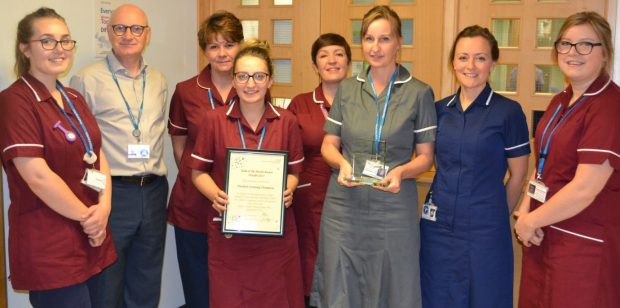A new pathway that has transformed postnatal care earned the newborn screening team at the Royal United Hospitals Bath NHS Foundation Trust a team of the month award.

What we changed
We won the award for innovation, improved practice and having a positive impact on the health and wellbeing of families.
This came just 6 months after we had transitioned our newborn hearing screening programme from a community screening model, with health visitors doing the screening, to a hospital model. This means screening is now more timely, happening on day 5 after birth instead of around day 10.
Changes to the funding stream for newborn hearing screening provided our trust with a fantastic opportunity to introduce this new pathway to postnatal care. Our new one-stop service for newborn screening is already showing real benefits and fantastic results.
Back in December 2016, we recruited a specialist team of maternity care assistants who are our screening champions. Following an intensive training programme, they started screening in April 2017.
On day 5 after birth, our screening champions now visit families at our clinics or in their homes and:
- complete hearing screening
- carry out newborn blood spot screening
- complete maternal and mood observations
- weigh and check the baby
- provide mums with feeding support
Benefits of new approach
Since introducing this new approach to newborn screening we have seen:
- 50% decrease in hearing referral rates from AOAE1 to AOAE2
- 45% decrease in hearing referral rates from AOAE2 to AABR
- 30% decrease in hearing referral rates for diagnostic assessment
- 85% reduction in blood spot avoidable repeats
Three babies were diagnosed with hearing loss between April and June 2017. All 3 were diagnosed by 3 weeks of age. Under the previous model the average age of diagnosis was 7 weeks of age. The earlier a baby is identified as having hearing impairment or deafness, the better their long-term educational and social outcomes.
We know we can attribute this reduction in referral rates to having a small team of dedicated experts who screen on day 5 for hearing and blood spot, and a screening service that is fully embedded within the maternity department.
Transitioning any service has its challenges but we are very proud of our new team and how maternity has welcomed us. Our combined service has significantly reduced unnecessary referrals and parental anxiety, while continuing to maintain excellent coverage and adherence to key standards. It’s still early days but we are excited to see how our service develops.
PHE Screening blog
PHE Screening Blog articles provide up to date news from all NHS screening programmes. You can register to receive updates direct to your inbox, so there’s no need to keep checking for new blog articles.
3 comments
Comment by Heather Crowley posted on
Congratulations Victoria .
This new approach is very interesting.
Comment by Hannah Garnett posted on
Well done Victoria. Hugely deserved award & recognition of all your hard work & dedication. Congratulations!
Comment by Sharon Webb posted on
Congratulations a fabulous approach others should aspire to.